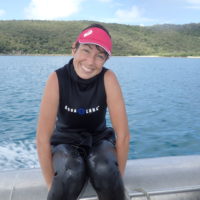Saskia Jurriaans
PhD
James Cook University
saskia.jurriaans@my.jcu.edu.au

From 2005 to 2022, the main node of the ARC Centre of Excellence for Coral Reef Studies was headquartered at James Cook University in Townsville, Queensland (Australia)








PhD Candidate
Coral Ecophysiology Lab
James Cook University, College of Marine and Environmental Sciences &
ARC Center of Excellence for Coral Reef Studies
James Cook University
Townsville, QLD 4811
Australia
Building 145-317
Phone: +61 (0) 475 431 950
E-mail: saskia.jurriaans@my.jcu.edu.au
Saskia grew up in The Netherlands, far away from any coral reef. However, that did not stop her from being in the water whenever she could. Her curiosity for the natural world led her to a bachelor in Biology at Utrecht University, followed by a master in Marine Resources Management at Wageningen University. Meanwhile she dove in the Dutch waters, the Mediterranean and a lot of tropical oceans, after which she was hooked on coral reefs. Being confronted with the fast degradation of coral reefs due to climate change and other human caused stressors, Saskia decided that she wanted to pursue a PhD in coral reef research. She first went to the Centre Scientifique in Monaco to gain more skills and knowledge about coral physiology and then moved to Townsville. Saskia joined the Hoogenboom Coral Ecophysiology lab as a PhD candidate in 2014. Her research focusses on the variation in the thermal performance of corals across spatial and temporal scales and between corals that have different distribution ranges. Also, it always comes in handy that she speaks four languages: Dutch, English, French and Dolphin.
Project title:
The effect of spatial and temporal fluctuations in temperature on the thermal performance of scleractinian corals
Project Description:
Temperature affects the performance of crucial life-sustaining processes, such as growth. The optimal temperature for performance and the temperature range at which this performance is positive varies between species and geographic location. Increasing temperatures associated with climate change might negatively influence a species’ performance if it cannot adjust to the warmer environment. This may lead to local extinction and alter population dynamics. Corals in particular are vulnerable to increasing temperatures. To improve our understanding of coral population dynamics in a changing climate, this project will assess how within- and among-species variation in thermal performance affects key demographic rates of corals.
Supervisors:
Principle Supervisor: Dr. Mia Hoogenboom
Co-supervisor: Prof. Sean Connolly
Publication List:
Wijgerde, T., S. Jurriaans, M. Hoofd, J.A.J. Verreth, R. Osinga (2012). Oxygen and Heterotrophy Affect Calcification of the Scleractinian Coral Galaxea fascicularis. PLoS ONE, Vol. 7, Issue 12, e52702.
Awards and Grants:
James Cook International Postgraduate Award (PhD scholarship) 2014
Australian Coral Reef Society Travel Award to attend ACRS Conference 2014
New DNA techniques are being used to understand how coral reacted to the end of the last ice age in order to better predict how they will cope with current changes to the climate. James Cook Univer
A new study on the effects of climate change in five tropical countries has found fisheries are in more trouble than agriculture, and poor people are in the most danger. Distinguished Profess
James Cook University researchers have found brightly coloured fish are becoming increasingly rare as coral declines, with the phenomenon likely to get worse in the future. Christopher Hemingson, a
Researchers working with stakeholders in the Great Barrier Reef region have come up with ideas on how groups responsible for looking after the reef can operate more effectively when the next bleaching
Abstract: As marine species adapt to climate change, their heat tolerance will likely be under strong selection. Individual variation in heat tolerance and its heritability underpin the potential fo
Abstract: The Reef Ecology Lab in KAUST’s Red Sea Research Center explores many aspects of movement ecology of marine organisms, ranging from adult migrations to intergenerational larval dispersal
Abstract: Macroalgal meadows are a prominent, yet often maligned component of the tropical seascape. Our work at Ningaloo reef in WA demonstrate that canopy forming macroalgae provide habitat for ad
Abstract: Sharks are generally perceived as strong and fearsome animals. With fossils dating back at least 420 million years, sharks are not only majestic top predators but they also outlived dinosa
Abstract: Connectivity plays a vital role in many ecosystems through its effects on fundamental ecological and evolutionary processes. Its consequences for populations and metapopulations have been
Abstract: Evolution of many eukaryotic organisms is affected by interactions with microbes. Microbial symbioses can ultimately reflect host’s diet, habitat range, and even body shape. However, how
Abstract: The past few years have seen unprecedented coral bleaching and mortality on the Great Barrier Reef (GBR) but the consequences of this on biodiversity are not yet known. This talk will expl